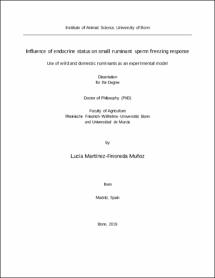Martínez-Fresneda Muñoz, Lucía: Influence of endocrine status on small ruminant sperm freezing response : Use of wild and domestic ruminants as an experimental model. - Bonn, 2019. - Dissertation, Rheinische Friedrich-Wilhelms-Universität Bonn, University of Murcia.
Online-Ausgabe in bonndoc: https://nbn-resolving.org/urn:nbn:de:hbz:5-55741
Online-Ausgabe in bonndoc: https://nbn-resolving.org/urn:nbn:de:hbz:5-55741
@phdthesis{handle:20.500.11811/8007,
urn: https://nbn-resolving.org/urn:nbn:de:hbz:5-55741,
author = {{Lucía Martínez-Fresneda Muñoz}},
title = {Influence of endocrine status on small ruminant sperm freezing response : Use of wild and domestic ruminants as an experimental model},
school = {{Rheinische Friedrich-Wilhelms-Universität Bonn} and {University of Murcia}},
year = 2019,
month = nov,
volume = 190,
note = {Assisted reproductive technology improves livestock management and allows the storage of valuable genetic material of wild and domestic species in germplasm banks. Nevertheless, the use of frozen-thawed sperm for artificial insemination does not provide the desirable fertility rates in small ruminants. The present study aimed i) to investigate the effect of rutting season, in vitro hormone supplementation, sperm source and capacitation status on sperm freezability and ii) to identify candidate markers of sperm freezing ability by analyzing sperm proteome in wild and domestic small ruminant species. Samples were collected from Iberian ibex (Capra pyrenaica), Mouflon (Ovis musimon), Chamois (Rupicapra pyrenaica), domestic Merino rams (Ovis aries) and domestic Murciano-Granadina bucks (Capra hircus). Sperm was cryopreserved by conventional slow-freezing in straws and by ultrarapid-freezing in pellets. Sperm proteome was assessed by liquid chromatography - mass spectrometry.
Sperm cryoresistance was lower in the middle of the rutting season, when the seasonal peak of testosterone and prolactin occurs, than at the end of the rutting season. In vitro supplementation with testosterone or prolactin decreased the post-thaw acrosome integrity in both domestic ram and buck. Sperm freezability was also affected by sperm source, being higher in epididymal than in ejaculated sperm. Levels of phosphorylation associated with capacitation status were higher in ejaculated than in epididymal sperm. Incubation under capacitating conditions induced an increase of tail phosphorylation in both types of sperm. Proteome studies revealed 25 proteins to be more abundant at the end of the rutting season than in the middle of the rutting season in wild species and, at the same time, more abundant in epididymal than in ejaculated sperm, hence these proteins were strongly associated with higher sperm freezability across species and across conditions of study.
This study shows substantial changes of the sperm proteome during the rutting season and upon ejaculation in small ruminants. These findings contribute to select the most suitable moment of the year to cryopreserve sperm samples to be stored in genetic resource banks. The identification of candidate markers of sperm freezability elucidated in the present study could be further investigated and used as supplements in freezing extenders to improve sperm functionality after doing artificial insemination with frozen-thawed semen.},
url = {https://hdl.handle.net/20.500.11811/8007}
}
urn: https://nbn-resolving.org/urn:nbn:de:hbz:5-55741,
author = {{Lucía Martínez-Fresneda Muñoz}},
title = {Influence of endocrine status on small ruminant sperm freezing response : Use of wild and domestic ruminants as an experimental model},
school = {{Rheinische Friedrich-Wilhelms-Universität Bonn} and {University of Murcia}},
year = 2019,
month = nov,
volume = 190,
note = {Assisted reproductive technology improves livestock management and allows the storage of valuable genetic material of wild and domestic species in germplasm banks. Nevertheless, the use of frozen-thawed sperm for artificial insemination does not provide the desirable fertility rates in small ruminants. The present study aimed i) to investigate the effect of rutting season, in vitro hormone supplementation, sperm source and capacitation status on sperm freezability and ii) to identify candidate markers of sperm freezing ability by analyzing sperm proteome in wild and domestic small ruminant species. Samples were collected from Iberian ibex (Capra pyrenaica), Mouflon (Ovis musimon), Chamois (Rupicapra pyrenaica), domestic Merino rams (Ovis aries) and domestic Murciano-Granadina bucks (Capra hircus). Sperm was cryopreserved by conventional slow-freezing in straws and by ultrarapid-freezing in pellets. Sperm proteome was assessed by liquid chromatography - mass spectrometry.
Sperm cryoresistance was lower in the middle of the rutting season, when the seasonal peak of testosterone and prolactin occurs, than at the end of the rutting season. In vitro supplementation with testosterone or prolactin decreased the post-thaw acrosome integrity in both domestic ram and buck. Sperm freezability was also affected by sperm source, being higher in epididymal than in ejaculated sperm. Levels of phosphorylation associated with capacitation status were higher in ejaculated than in epididymal sperm. Incubation under capacitating conditions induced an increase of tail phosphorylation in both types of sperm. Proteome studies revealed 25 proteins to be more abundant at the end of the rutting season than in the middle of the rutting season in wild species and, at the same time, more abundant in epididymal than in ejaculated sperm, hence these proteins were strongly associated with higher sperm freezability across species and across conditions of study.
This study shows substantial changes of the sperm proteome during the rutting season and upon ejaculation in small ruminants. These findings contribute to select the most suitable moment of the year to cryopreserve sperm samples to be stored in genetic resource banks. The identification of candidate markers of sperm freezability elucidated in the present study could be further investigated and used as supplements in freezing extenders to improve sperm functionality after doing artificial insemination with frozen-thawed semen.},
url = {https://hdl.handle.net/20.500.11811/8007}
}






